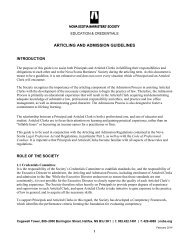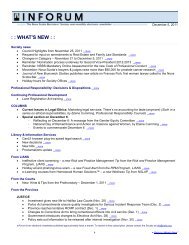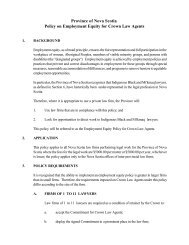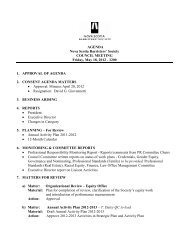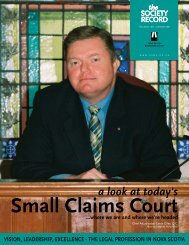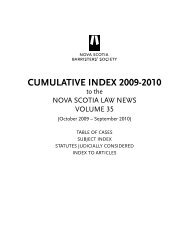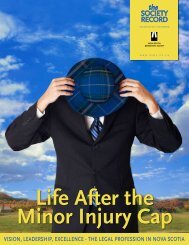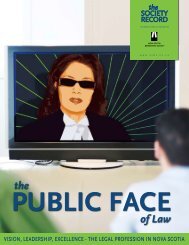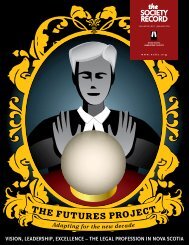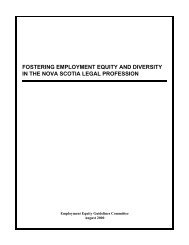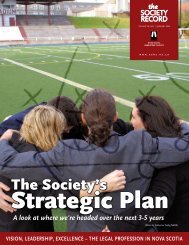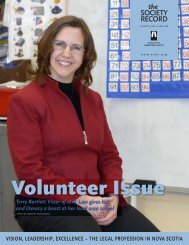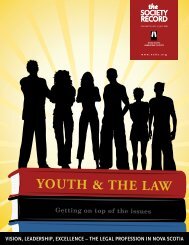SR Vol 27 No 4, October 2009 - Nova Scotia Barristers' Society
SR Vol 27 No 4, October 2009 - Nova Scotia Barristers' Society
SR Vol 27 No 4, October 2009 - Nova Scotia Barristers' Society
- No tags were found...
You also want an ePaper? Increase the reach of your titles
YUMPU automatically turns print PDFs into web optimized ePapers that Google loves.
George MacDonald QCMcInnes CooperThe Donald MarshallInquiry was my firstexposure to the role ofCommission Counsel. It wasvery difficult for me to adapt and perform this function, given thatnormally I was a very aggressive adversary for one particular position.My co-counsel, David Orsborn and Wylie Spicer, and I were giventhe task of locating and presenting to theCommissioners, in open hearings, all ofthe evidence that was relevant to the issuesbeing considered by the Commissioners.It was not our task to prove why DonaldMarshall, Jr. had been wrongfully convicted;or to prove that the justice system hadoperated properly. To that end, we were tomake certain that all available evidence was before the Commissionersin order that they could make their findings and decide on theirrecommendations. From time to time it was required that we becomeaggressive for a short period of time with a particular witness, to makecertain the evidence in the possession of that witness was brought out.We attempted, however, to ensure that we did not cross-examine anywitness.addition, various experts and scholars were retained to provide adviceand assistance to the Commissioners who were to make recommendationsconcerning any changes that should be made to the system.In the course of performing our role as Commission Counsel, wenecessarily had contact with Donald Marshall, Jr. He knew who wewere, and that we were the Commissioners’ lawyers, but understandablyhe was cautious about dealing with anyone who he considered tobe part of the establishment.I also had frequent opportunity to speak with his father, DonaldMarshall, Sr., who at the time was the Grand Chief of the Mi’kmaqNation. During those encounters, I came to appreciate the wisdom thatChief Marshall possessed. He assisted me in understanding some ofthe customs and characteristics of the Mi’kmaq. I came to understandthat Mi’kmaq can be very reserved people who react differently, forexample, to aggressive questioning. Once Chief Marshall explained thisto me, I noticed how potential Mi’kmaq witnesses I was questioninghad difficulty looking me in the eye. They reacted the same waywhen being questioned under oath, and I understood how thistimid nature could be misinterpreted to be signifying admissions orattempting to evade giving truthful evidence. This type of informationwas made known to the Commissioners, who took it into accountwhen considering their recommendations. Often, during breaks inthe hearings, Chief Marshall and I would speak and he would makesome very telling observations about what was taking place. I learned atremendous amount from this very accomplished man and at the endof the hearings, considered I had a much greater appreciation of theMi’kmaq people than I had in the past.I had only one encounter with Donald Marshall, Jr.’s mother. Onceall evidence had been presented to the Commissioners, the variousinterested parties were permitted to make closing submissions. FinallyI, on behalf of myself and co-counsel,“...understandably he wascautious about dealing withanyone who he considered to bepart of the establishment.”summed up our assessment of theevents that led to Donald Marshall,Jr.’s wrongful conviction, his ultimaterelease from prison and the eventsthat took place thereafter. Here againI attempted not to be an advocate,but given the evidence that had cometo light, I am certain that from time to time I suggested, or stated,that the justice system in <strong>No</strong>va <strong>Scotia</strong> had failed Donald Marshall, Jr.When my submission was completed, I had my only encounter withMrs. Marshall. She approached me, looked in my eyes, touched myarm and said, “Thank you.” About 10 years later, I was speaking toa large group of lawyers and was asked to recall the highlight of mycareer. I told the story about what Mrs. Marshall said to me.To fulfill our task it was necessary that we meet with everyone whomight have relevant evidence or knowledge. Quite often, those meetingswere held in the presence of potential witnesses and their counsel.Usually we would meet with a witness prior to such witness appearingto give evidence before the Commissioners, and would review in considerabledetail the topics to be considered, and explain the evidencewe understood could be presented through that witness.Given that the Commissioners were asked to determine why DonaldMarshall had been wrongfully convicted, it became necessary to delveinto the system used in <strong>No</strong>va <strong>Scotia</strong> and determine how it worked. InSeveral months before his death, I ran into Donald Marshall, Jr. ata dinner event held on behalf of the Special Olympics. The guestspeaker was Rubin “Hurricane” Carter. Someone told me that DonaldMarshall, Jr. was in the audience to hear the presentation of anotherwell-known wrongfully convicted person. I sought him out. He knewme immediately and we had a very pleasant chat. He said “George, Iam in trouble with the law again.” I expressed the view that he wouldmake out fine. The next word I had was that Donald had died. I believethe pending charges against him were withdrawn.20 The <strong>Society</strong> Record



